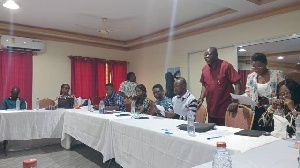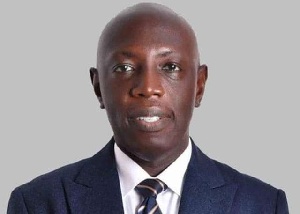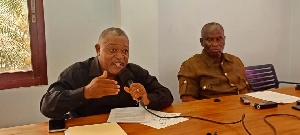Opinions of Tuesday, 3 June 2025
Columnist: www.ghanawebbers.com
FNBSPH-UHAS trains journalists on nutrition, public health to drive change through media advocacy
The Fred N. Binka School of Public Health (FNBSPH) at the University of Health and Allied Sciences (UHAS) has organized a two-day workshop. This event was in partnership with Women, Media and Change (WOMEC). It targeted journalists from the Volta and Oti Regions.
The training aimed to improve media engagement on public health issues in Ghana. Key topics included graduate unemployment and childhood stunting. The workshop also launched the UHAS-NKABOM Mastercard Project. This $9.8 million initiative is funded by a 10-year grant from the Mastercard Foundation.
The project aims to empower three million young Ghanaians through dignified employment. It also seeks to address malnutrition and childhood stunting.
Professor Frank Baiden is the Dean of FNBSPH and Principal Investigator of the NKABOM Project. He called this initiative a "watershed moment" for the school’s 12-year history. The project, named ‘Nkabom,’ means ‘togetherness’ in Akan. It involves collaboration among seven Ghanaian institutions and McGill University in Canada.
Professor Baiden highlighted that many public health graduates struggle to find jobs after graduation. He noted that families invest heavily in their education, yet many remain unemployed. The project aims to change this by reforming university curricula to include more entrepreneurial skills.
The new curriculum will balance theoretical knowledge with practical experience, targeting a 50-50 ratio. Innovative approaches will include agro waste processing, aquaculture technology, and agribusiness education. These efforts aim to equip graduates with skills to create jobs instead of seeking them.
The Nkabom Project also focuses on creating sustainable livelihoods for youth, women, and marginalized communities. Community-based research is underway to develop models addressing childhood stunting in rural areas.
Professor Baiden urged journalists to support the project's mission through their reporting. He emphasized the media's role in promoting social accountability and raising public awareness. He encouraged media practitioners to advocate for completing UHAS’s permanent campus at Fodome.
"We need action to finish the structure," he said about moving the campus home. Workshop participants pledged to use their platforms for amplifying the Nkabom project's impact. They committed to holding duty bearers accountable for public good.
The Nkabom Project aspires not only to transform public health education but also build resilient communities by 2030.











